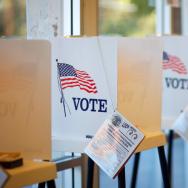With at least 256 women set to appear on ballots for congressional races this November, 2018 has been cast as the “Year of the Woman.” If the women predicted to win their races are successful, 25 percent of Congress could be female by the start of the next legislative year.
What might this mean for the future of public policy in America?
“On the legislative front, I think the historical pattern would hold,” said Rebecca Sive, the founding director of Women in Public Leadership, an executive education program at the Harris School of Public Policy. “Which is to say that, at least on the Democratic side, the women legislators who are newly elected would be like their sisters who preceded them—interested in issues like equal pay, reproductive rights and related policies. Most of them have that kind of policy agenda as candidates.”
Sive, who has lobbied for women’s issues since the mid-1970s, was instrumental in the historic election of Carol Moseley-Braun, JD’72, during the first “Year of the Woman.” In 1992 Braun became the first female African-American senator in U.S. history—one of four women to win Senate seats that year, along with 24 elected to the House of Representatives.
The author of the recent book, Vote Her In: Your Guide to Electing Our First Woman President, Sive is among those with ties to Harris Public Policy examining the impact of women’s increased presence in government—or working in Congress to change policy around so-called “women’s issues.”
“I don't think there are any issues, as a legislator, that are uniquely women’s issues,” said New York State Senator Liz Krueger, AM’81, who has served in New York’s Senate since 2002 and is up for reelection this November. “Having said that, do I notice that discussions of child policy, reproductive health policy [and] family law get much more attention, at least initially, for women legislators? Yes, they do.”
Women’s impact on public policy
In a recent paper, Prof. Alex Fouirnaies proposes the impact that women in government could have—and have had—on the formation of public policy initiatives when elected in larger numbers.
Fouirnaies’ research focuses on state legislatures, which on average are already slightly more female than Congress at large (the percentage of state legislators who are women grew from about 20 percent in 1990 to roughly 25 percent in 2015, according to the data), but his findings are applicable at all levels of government. In applying original data to existing research on the inefficacy of the governmental gender gap, Fouirnaies attempts to quantify women’s impact on public policy vis-à-vis their current representation on select legislative committees.
“Most if not all of the overall difference in men and women’s focus on women’s issues can be explained by the higher rate at which women serve on women’s issues committees,” according to the findings of Fouirnaies and his co-researchers. “Although women might self-select onto these committees...we see no evidence that women exhibit a pre-existing interest in women’s issues legislation before they are assigned to women’s issues committees.”
For the purposes of their research, Fouirnaies and his collaborators defined “women’s issues” as health, education and welfare (first identified as such in Michele Swers’s 2001 paper, “Understanding the Policy Impact of Electing Women: Evidence from Research on Congress and State Legislatures”). They then used these parameters to examine what kinds of bills female legislators sponsor.
“The bills that women sponsor also focus, by and large, on women’s issues,” they write. “Again, roughly 23.5 percent of legislators in our dataset are women, but more than 30 percent of bills categorized as concerning welfare are sponsored by women legislators, and roughly 28 percent of bills categorized as health-related are sponsored by women. Women also sponsor education bills at an unusually high rate.”
Trying to reverse short-term thinking
Fewer women in government means less funding for social issues that have been siloed as women’s issues, which ensures that such sectors will never float to the same level of prestige as top-funded committees such as finance and rules.
For the past eight years, Krueger has attempted to pass the Reproductive Health Act in New York, a bill which would codify the protections of Roe v. Wade for all New Yorkers, even if that decision were overturned by the U.S. Supreme Court.
“I am one legislator away from having the 32 votes I need to pass this bill in the Senate,” she said. “It's already passed the Assembly eight years in a row. I believe that we're on the verge of seeing several new Democrats in the state Senate after the Nov. 6 election. Several of them are women. Every single Democrat running for the Senate and the sitting Democrats have all pledged their support for this bill.”
Even though women are less likely to serve on “top-flight” committees such as agriculture, commerce, energy, finance, labor, transportation, and ways and means, there is a certain forward thinking-ness that women bring to their advancement of these traditional women’s issues that, when implemented, could have reverberatory impact in “top flight” sectors of public policymaking. It’s not that women enter politics with pre-existing policy interests or backgrounds, according to “The Gender Gap,” but that women are driven to policy creation by distinct institutional factors.
“Something that really concerns me in Congress is the short-term thinking,” said Tabitha Isner, MPP’09, who is running as the Democratic nominee for a congressional seat in Alabama this November.
“A great example of that is the need for affordable, high-quality child care. Despite the incredible return on investment [in early childhood education], it's not been something that Congress has invested in as fully as it should. And I think their reason is that there's a sense that the money isn't going to pay off until later. Men don't tend to feel the consequences of the lack of paid family leave as severely as women do. We need to have people in office who are willing to explain and defend those kinds of investments, and how it makes perfect sense to spend money now in order to prevent problems later.”
—Adapted from a story that first appeared on the Harris Public Policy website.

